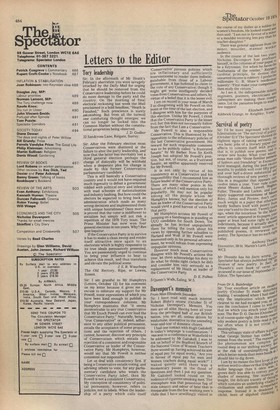Davenport's memoirs
From Miss Elizabeth Snowden Sir: I have read with much interest Robert Blake's review (October 5) of Nicholas Davenport's Memoirs. You men are all alike. Having been all your lives the privileged half of our British nation, you are all, unless driven by misfortune, insensitive to the unending wear-and-tear of domestic chores.
I had one contact with Hugh Gaitskell, in today's language 'a confrontation.' I was sent to a conference at Wakefield to be addressed by Mr Gaitskell. I was to ask on behalf of the Bradford Branch of the National Union of Women Teachers (now wound up, having achieved its aim of equal pay for equal work), "Are you in favour of equal pay for men and women teachers doing equal work?" I waited quietly until there was a momentary pause in the flood of questions and then I put my question. Mr Gaitskell looked round on the audience of cigarette-smoking men. The atmosphere was that poisonous fug of stale tobacco and odour of beer that is inseparable from the few working men's clubs that I have unwillingly visited in
the course of my duties as a soldier far women's freedom. He looked round and then said: "I am not in favour of a miner or a moulder receiving less pay than his teacher-daughter." There was general applause from the miner, moulder, manual worker audience. In the course of the last two years' Nicholas Davenport has professed himself, in the columns of your paper, to be a Keynesian. Yet when he faces the "euthanasia of the rentier," Keynes's cardinal principle, he denies that unearned income is robbery. I prefer the, millionaire G. B. Shaw's intellectual honesty: "First make your competence, then study the virtues."
As I see it, the indispensable minersff engineers, postmen, electricians an railwaymen are making their cornPe" tence. Let the parasites begin to wash° few nappies! Elizabeth Snowdell Kildwick Grange, nr. Keighley, Yorka


































 Previous page
Previous page